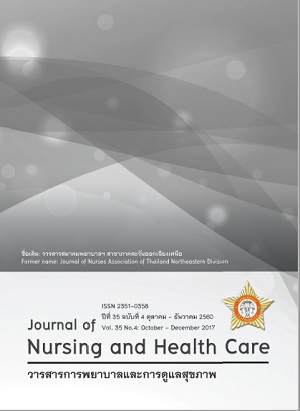ผลของโปรแกรมสุขศึกษาโดยประยุกต์ใช้ทฤษฎีการดูแลตนเองในการพัฒนาพฤติกรรมการป้องกันภาวะแทรกซ้อนทางไตของผู้ป่วยโรคความดันโลหิตสูง Effects of Health Education Programs Applying Self-care Theory to Prevent Kidney Disease among Hypertensive Patients
คำสำคัญ:
โปรแกรมสุขศึกษา การดูแลตนเอง ความดันโลหิตสูง, health education program self-care hypertensionบทคัดย่อ
การวิจัยกึ่งทดลองนี้ มีวัตถุประสงค์เพื่อศึกษาผลของโปรแกรมสุขศึกษา ที่ส่งผลต่อความรู้ และพฤติกรรมในการดูแลตนเองของผู้ป่วยความดันโลหิตสูง กลุ่มตัวอย่างกลุ่มเดียว วัดก่อนและหลังการทดลอง ระยะเวลาศึกษา 9 สัปดาห์ กลุ่มตัวอย่างจำนวน 30 คน เลือกโดยวิธีการสุ่มแบบเฉพาะเจาะจง โดยมีเกณฑ์คือ ได้รับการวินิจฉัยจากแพทย์ว่าเป็นโรคความดันโลหิตสูง หรือมีค่าความดันโลหิต Systolic มากกว่าหรือเท่ากับ 140 mmHg และมีค่าความดัน Diastolic มากกว่าหรือเท่ากับ 90 mmHg และป่วยด้วยโรคความดันโลหิตสูงมากกว่า 1 ปี และยังไม่มีภาวะแทรกซ้อนทางไต โดยอาศัยอยู่ในชุมชนตำบลนาฝาย หมู่ที่ 3 อำเภอเมือง จังหวัดชัยภูมิ โปรแกรมสุขศึกษาประกอบด้วยการสอนสุขศึกษาเรื่องความดันโลหิตสูงโดยทีมผู้วิจัย เพื่อให้กลุ่มตัวอย่างมีความรู้ในการดูแลตนเองและปรับเปลี่ยนพฤติกรรมการดูแลตนเองในเรื่องการรับประทานอาหาร การออกกำลังกาย การผ่อนคลายความเครียด การงดหรือลดปริมาณการสูบบุหรี่ การดื่มเครื่องดื่มที่มีแอลกอฮอล์ การรับประทานยาอย่างถูกต้อง และการตรวจตามนัด เพื่อลดภาวะแทรกซ้อนทางไต เครื่องมือที่ใช้ในการเก็บรวบรวมข้อมูลคือ แบบสอบถามข้อมูลทั่วไป แบบสอบถามความรู้และพฤติกรรมในการดูแลตนเองเพื่อป้องกันภาวะแทรกซ้อนทางไต เก็บข้อมูลก่อนการทดลองและหลังการทดลอง วิเคราะห์ข้อมูลด้วยสถิติพรรณนา และสถิติอ้างอิงโดยใช้ Dependent t-test ผลการศึกษาพบว่า ภายหลังการให้โปรแกรมสุขศึกษาโดยประยุกต์ใช้ทฤษฎีการดูแลตนเองในผู้ป่วยโรคความดันโลหิตสูง ค่าเฉลี่ยคะแนนหลังการทดลองด้านความรู้การดูแลตนเอง( X = 21.96 ,SD = 1.40 ) สูงกว่าก่อนการทดลอง ( X = 18.46 , SD = 3.06) และคะแนนพฤติกรรมการดูแลตนเองหลังการทดลอง ( X = 44.73 ,SD = 3.74) สูงกว่าคะแนนพฤติกรรมการดูแลตนเองก่อนการทดลอง( X = 40.93 ,SD = 5.12 ) อย่างมีนัยสำคัญทางสถิติที่ระดับ 0.05 ผลการศึกษานี้แสดงว่าโปรแกรมสุขศึกษา มีผลให้เกิดการเปลี่ยนแปลงความรู้และพฤติกรรมการดูแลตนเองดีขึ้น
The purpose of this Quasi-Experimental research was to study the effects of health education program applying self-care theory to enhance knowledge and behaviors to prevent kidney disease among hypertensive patients. The research used a one group pretest – posttest design. The research was conducted over a period of 9 weeks. The subjects were selected by purposive sampling and met the study criteria, consisted of 30 hypertensive patients. They were diagnosed by doctors and/or have had systolic blood pressure ≥ 140 mmHg or diastolic blood pressure ≥ 90 mmHg and high blood pressure more than 1 year no kidney complications. Live in the Tambon Na Fai Moo 3 Muang District Chaiyaphum province. The health education program comprised of health education for enhancing knowledge and modifying patients’ behaviors towards diet consumption, exercise, stress management, smoking and alcohol drinking reduction, proper medication usage and follow up. The instruments included questionnaires to collect data for self-care knowledge and behaviors. Data were collected before and after and were analyzed for percentage, mean, standard deviation and dependent t-test.
Results showed that after having the health education program applying self-care theory in hypertension patient, the score of self-care knowledge had higher post-test mean score ( X = 21.96 ,SD = 1.40 ) than the pre-test mean score (X = 18.46 ,SD = 3.06). Furthermore, the score of self-care behavior had higher post-test mean score (X = 44.73, SD = 3.74) than the pre-test mean score (X = 40.93, SD = 5.12) at the statistical significant of 0.05. The result indicated the effect of health education program on changing self-care knowledge and behavior of hypertension patient.



